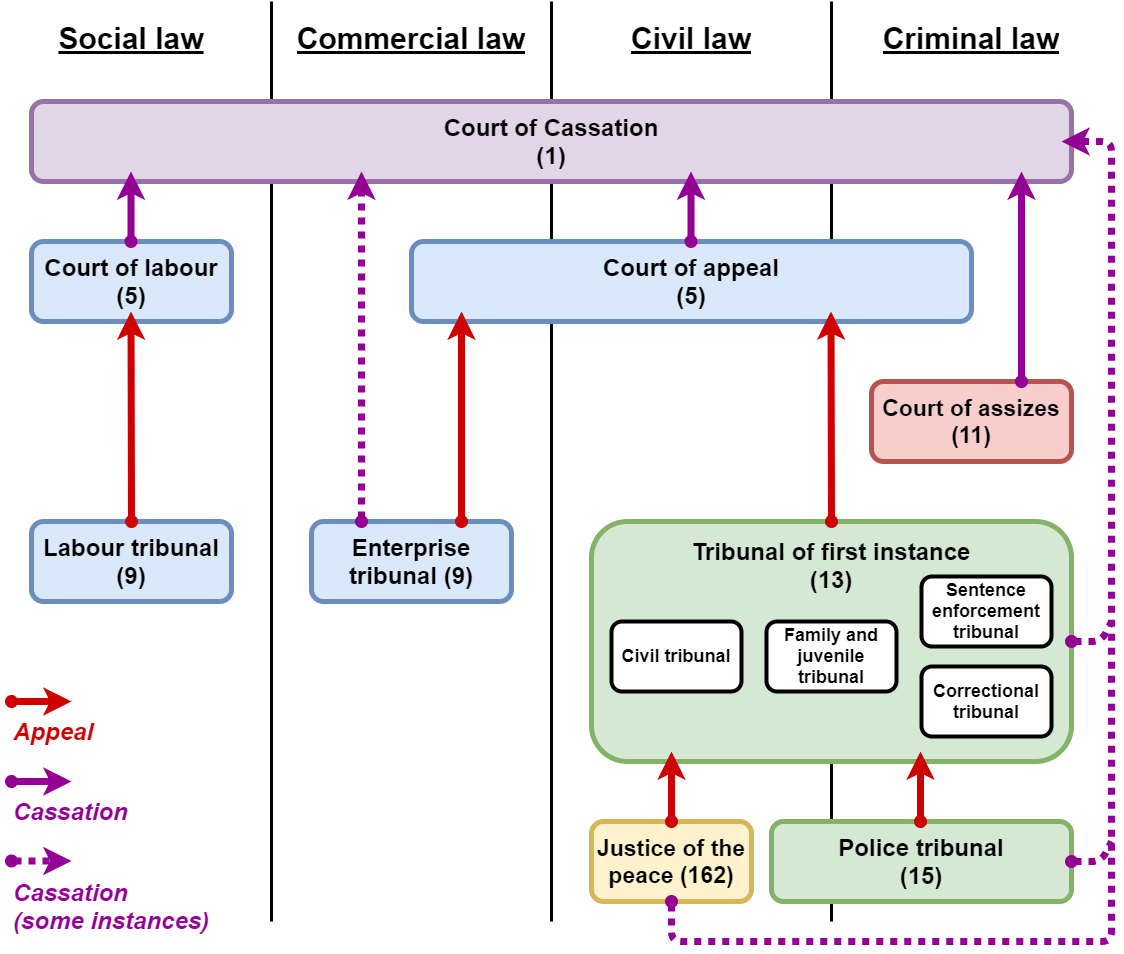|
Belgian Anti-Racism Law
The Belgian Anti-Racism Law, in full, the Law of 30 July 1981 on the punishment of certain acts inspired by racism or xenophobia, is a law against hate speech and discrimination passed by the Federal Parliament of Belgium in 1981 which made certain acts motivated by racism or xenophobia illegal. It is also known as the ''Moureaux Law'', as it was proposed to the Parliament by Justice Minister Philippe Moureaux. Historical context The first Belgian law proposal against racism was introduced in the wake of the signature by Belgium of the 1965 Convention on the Elimination of All Forms of Racial Discrimination at the Chamber of deputies by the Socialist MP Ernest Glinne on December 1, 1966, at the request of the MRAX (Movement against racism, antisemitism and xenophobia, Belgian equivalent of the French MRAP) which had prepared the proposal. The law proposal was introduced twice in 1966–1967 and again twice in 1968–1969. On July 20, 1980, a terrorist attack against Jewish childr ... [...More Info...] [...Related Items...] OR: [Wikipedia] [Google] [Baidu] |
Belgian Federal Parliament
The Federal Parliament is the bicameral parliament of Belgium. It consists of the Chamber of Representatives (Dutch: , french: Chambre des Représentants, german: Abgeordnetenkammer) and the Senate (Dutch: , french: Sénat, german: Senat). It sits in the Palace of the Nation (french: Palais de la Nation, nl, Paleis der Natie, german: Palast der Nation). The Chamber of Representatives is the primary legislative body; the Senate functions only as a meeting place of the federal communities and regions. The Constitution does not mention the Federal Parliament as such; it stipulates that the federal legislative power is exercised by the King and the Chamber of Representatives (and exceptionally the Senate), and defines when the United Chambers convene. Chamber of Representatives The Chamber of Representatives holds its plenary meetings in the Palace of the Nation, Brussels. Eligibility requirements for the Chamber are a minimum age of 21, citizenship, and residency in Belgium. Th ... [...More Info...] [...Related Items...] OR: [Wikipedia] [Google] [Baidu] |
Front De La Jeunesse (Belgium)
The Front de la Jeunesse (FJ) was a Belgian private militia. It was founded in 1973 by members of one of the so-called ''NEM-Clubs'', situated around the ''Nouvel Europe Magazine''. History A French-Algerian man was killed on December 4, 1980 in Brussels by members of the Front de la jeunesse. This killing provoked a huge anti-racist demonstration in Brussels and Philippe Moureaux, the Justice Minister A justice ministry, ministry of justice, or department of justice is a ministry or other government agency in charge of the administration of justice. The ministry or department is often headed by a minister of justice (minister for justice in a ... introduced before the Parliament a project of law against racism, adopted a few months later. In July 1981, members of the FJ set fire to the publishing building behind the ', after the magazine revealed some information about the internal structures of FJ. This was one of arson attacks that the group had carried out, with immigr ... [...More Info...] [...Related Items...] OR: [Wikipedia] [Google] [Baidu] |
Court Of Appeal (Belgium)
The courts of appeal ( nl, hof van beroep, french: cour d'appel, german: Appellationshof) are the main appellate courts in the judicial system of Belgium, which hear appeals against judgements of the tribunals of first instance, the enterprise tribunals and the presidents of those tribunals in their judicial area. There are five courts of appeal for each of the five judicial areas, which are the largest geographical subdivisions of Belgium for judicial purposes. The division of the Belgian territory into the five judicial areas (Antwerp, Brussels, Ghent, Liège and Mons) is laid down in article 156 of the Belgian Constitution. A judicial area covers multiple judicial arrondissements ("districts"), except for the judicial area of Mons. Each arrondissement has a tribunal of first instance. Further below, an overview is provided of the five courts of appeal and the judicial arrondissements their judicial area covers. It is important to note that the courts of appeal do not hear a ... [...More Info...] [...Related Items...] OR: [Wikipedia] [Google] [Baidu] |
Usenet
Usenet () is a worldwide distributed discussion system available on computers. It was developed from the general-purpose Unix-to-Unix Copy (UUCP) dial-up network architecture. Tom Truscott and Jim Ellis conceived the idea in 1979, and it was established in 1980.''From Usenet to CoWebs: interacting with social information spaces'', Christopher Lueg, Danyel Fisher, Springer (2003), , Users read and post messages (called ''articles'' or ''posts'', and collectively termed ''news'') to one or more topic categories, known as newsgroups. Usenet resembles a bulletin board system (BBS) in many respects and is the precursor to the Internet forums that have become widely used. Discussions are threaded, as with web forums and BBSs, though posts are stored on the server sequentially.The jargon file v4.4.7 , Jargon File Archive. [...More Info...] [...Related Items...] OR: [Wikipedia] [Google] [Baidu] |
Suspended Sentence
A suspended sentence is a sentence on conviction for a criminal offence, the serving of which the court orders to be deferred in order to allow the defendant to perform a period of probation. If the defendant does not break the law during that period and fulfills the particular conditions of the probation, the sentence is usually considered fulfilled. If the defendant commits another offence or breaks the terms of probation, the court can order the sentence to be served, in addition to any sentence for the new offence. Australia In Australia, suspended sentences are commonly imposed in order to alleviate the strain on overcrowded prisons. For example, an individual may be sentenced to a six-month jail term, wholly suspended for six months; if they commit any other offence during that year, the original jail term is immediately applied in addition to any other sentence. As of 1 September, 2014, suspended sentences no longer exist in Victoria, and in its place are community corr ... [...More Info...] [...Related Items...] OR: [Wikipedia] [Google] [Baidu] |
Vlaams Blok
''Vlaams Blok'' ( en, Flemish Block, or VB) was the name of a Belgian far-right and secessionist political party with an anti-immigration platform.Erk, 2005, pp. 493-502. Its ideologies embraced Flemish nationalism, calling for the independence of Flanders. The party originated from split within the Volksunie (VU) party after the right-wing separatist and national conservative wing became disgruntled with the compromise of accepting Belgian federalism over Flemish interests, and what they saw as the VU's move to the left. The former VU members created the Flemish National Party (VNP) and the Flemish People's Party (VVP) which formed an electoral alliance called ''Vlaams Blok'' in 1978, before merging to create Vlaams Blok as a political party in 1979. ''Vlaams Blok'' was the most notable militant right wing of the Flemish movement and its track record in the Flemish and Belgian parliament elections was strong, making it one of the most successful nationalist parties in Western Eu ... [...More Info...] [...Related Items...] OR: [Wikipedia] [Google] [Baidu] |
Belgian Holocaust Denial Law
The Belgian Holocaust denial law, passed on 23 March 1995, bans public Holocaust denial. Specifically, the law makes it illegal to publicly "deny, play down, justify or approve of the genocide committed by the German National Socialist regime during the Second World War". Prosecution is led by the Belgian Centre for Equal Opportunities. The offense is punishable by imprisonment of up to one year and fines of up to 2,500 EUR. Legislative history The Holocaust denial bill, drafted by Claude Eerdekens and Yvan Mayeur of the Parti Socialiste, was introduced in the Chamber of Representatives by Eerdekens ( PS), Marcel Cheron (Ecolo), Marcel Colla ( SP), Yvan Mayeur ( PS), Luc Dhoore ( CVP), Raymond Langendries ( CDH), Louis Michel ( MR) and Mieke Vogels ( Agalev) on 30 June 1992. The bill passed the Chamber of Representatives on 2 February 1995, with 194 votes in favour, 0 against and 0 abstentions. The bill passed the Senate on 14 March 1995. The Vlaams Blok, the predecessor o ... [...More Info...] [...Related Items...] OR: [Wikipedia] [Google] [Baidu] |
Centre For Equal Opportunities And Opposition To Racism
Unia or the Interfederal Center for Equal Opportunities (Dutch: , French: Unia (institution) ''Centre pour l'égalité des chances et la lutte contre le racisme'' ) is an independent public institution that fights discrimination and promotes equal opportunities in Belgium. History The Centre was founded in 1993 by an Act of the Belgian Chamber of People's Representatives. In 2003, the competencies of the Centre have been further expanded to include 'non-racial' forms of discrimination. The Centre has also been given the authority to intervene on the grounds of the law against negationism. In 2011, the Centre received the mandate of independent mechanism responsible for the promotion, protection and monitoring of the implementation of the United Nations Convention on the Rights of Persons with Disabilities. In 2013, the federal government, the regions and communities signed a partnership agreement officially making the former Centre - now Unia - an interfederal institution ... [...More Info...] [...Related Items...] OR: [Wikipedia] [Google] [Baidu] |
Apartheid
Apartheid (, especially South African English: , ; , "aparthood") was a system of institutionalised racial segregation that existed in South Africa and South West Africa (now Namibia) from 1948 to the early 1990s. Apartheid was characterised by an authoritarian political culture based on ''baasskap'' (boss-hood or boss-ship), which ensured that South Africa was dominated politically, socially, and economically by the nation's minority white population. According to this system of social stratification, white citizens had the highest status, followed by Indians and Coloureds, then black Africans. The economic legacy and social effects of apartheid continue to the present day. Broadly speaking, apartheid was delineated into ''petty apartheid'', which entailed the segregation of public facilities and social events, and ''grand apartheid'', which dictated housing and employment opportunities by race. The first apartheid law was the Prohibition of Mixed Marriages ... [...More Info...] [...Related Items...] OR: [Wikipedia] [Google] [Baidu] |
Flemish Christian Democrats
Christian Democratic and Flemish (, , CD&V) is a Flemish Christian-democratic political party in Belgium. The party has historical ties to both trade unionism ( ACV) and trade associations (UNIZO) and the Farmer's League. Until 2001, the party was named the Christian People's Party (''Christelijke Volkspartij'', CVP). It was traditionally the largest political party of Flanders, until it was overtaken by the New Flemish Alliance (N-VA) in the 2010s. CD&V participated in most governments and has generally the largest number of mayors. Most Prime Ministers of Belgium and Ministers-President of Flanders have been CD&V politicians. Herman Van Rompuy, the president of the European Council from 2009 to 2014, is one of the leading politicians of CD&V. CD&V is a member of the European People's Party (EPP) and Centrist Democrat International. History The history of the CD&V dates back to the 19th century. It originated in the 19th century Catholic Party. At the end of the century, the ... [...More Info...] [...Related Items...] OR: [Wikipedia] [Google] [Baidu] |
Prime Minister
A prime minister, premier or chief of cabinet is the head of the cabinet and the leader of the ministers in the executive branch of government, often in a parliamentary or semi-presidential system. Under those systems, a prime minister is not the head of state, but rather the head of government, serving under either a monarch in a democratic constitutional monarchy or under a president in a republican form of government. In parliamentary systems fashioned after the Westminster system, the prime minister is the presiding and actual head of government and head/owner of the executive power. In such systems, the head of state or their official representative (e.g., monarch, president, governor-general) usually holds a largely ceremonial position, although often with reserve powers. Under some presidential systems, such as South Korea and Peru, the prime minister is the leader or most senior member of the cabinet, not the head of government. In many systems, the prime minister ... [...More Info...] [...Related Items...] OR: [Wikipedia] [Google] [Baidu] |



